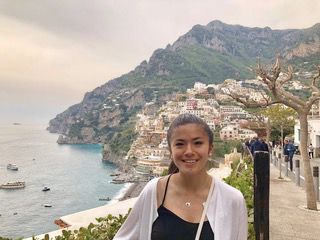Senior Spotlight: Alexa Canaan

Alexa Canaan
“On my SRS trip to Bosnia,” Alexa Canaan said, a mathematical economics major from Northborough, MA, “Professor Ray Douglas smacked me in the face. With his words. It’s a moment I think back to, more often than I’m willing to admit.”
In the fall of 2017, Canaan had taken the Century of Camps, a course focused on internment camps as a strategy of war during the twentieth century. She’d just arrived in Sarajevo, the capital of Bosnia and Herzegovina, and would soon visit camps from the Bosnian War.
“When we landed in Sarajevo,” said Canaan, “we were sitting on a rickety public bus, we’re getting closer to our hotel and we’re driving past all these building that have clearly been abandoned, there were bullet holes in the buildings, and I said, ‘This is crazy.’” Canaan paused before repeating Douglas’ response. “He turned around said, ‘this isn’t crazy. Your life, where people aren’t trying to kill you because of who you are and your identity, that’s not normal. That’s crazy.’ It hurt when he said it because he totally called me out, but that’s where I was like I need to be uncomfortable because that’s how I’m going to learn. In that split second, the way I viewed the world changed.”
Because of her experiences in Bosnia, Canaan decided to seek experiences of discomfort, which led her to enroll in Professor Jeff Spires’ Discourses of Whiteness course this fall. The class has pushed Canaan to discuss her own identity as a mixed-race woman on campus and elsewhere.
“One thing I’ve never been able to verbalize,” said Canaan, “is the complications of my identity as a mixed race person— I’m half-Chinese, half-Jewish— because I’ve never been able to understand it. Taking the course, I read papers, I read articles about other people of mixed race, which helped me understand my own experiences better. At the same time, having discussions about those papers, and being cold-called, even though it was a little uncomfortable, forced me to be better about explaining what being mixed-race means to me. Personal synthesis skills are hard to learn if a teacher isn’t personally invested in you.”
As she reflected on the formative moments of her life, Canaan’s analysis was imbued with, as Joan Didion says, “the sense that one lives by doing things one does not particularly want to do, by putting fears and doubts to one side, by weighing immediate comforts against the possibility of larger, even intangible comforts.” Didion and Canaan are both conducting a delicate benefit costs analysis, tipping the scales of the present to favor the future. Canaan recognizes that the most efficient path to selfhood is through tricky territory, riding a public bus through a war-torn city or pointedly confronting the discordance of her identity in class.
It takes great bravery to acknowledge the dividends of discomfort, to recognize that these experiences will leave us sadder, but ultimately wiser about our place in the world. Ticket in hand, however, Canaan will ride it out, hoping the larger comforts were worth the trip.







